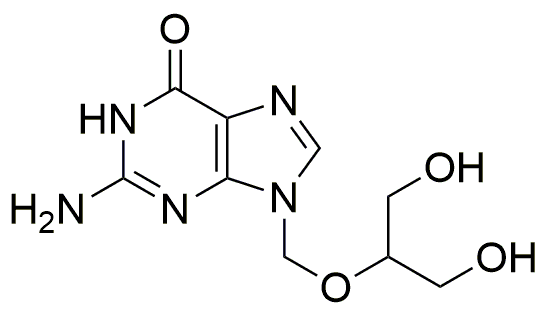Ganciclovir is widely utilized in research focused on:
- Antiviral Treatments: Primarily used in the treatment of cytomegalovirus (CMV) infections, especially in immunocompromised patients, such as those undergoing organ transplants or with HIV/AIDS.
- Research in Viral Pathogenesis: Employed in laboratory studies to understand the mechanisms of CMV and other herpesviruses, aiding in the development of new antiviral therapies.
- Pharmaceutical Development: Acts as a key compound in the formulation of antiviral medications, allowing researchers to explore combination therapies that enhance efficacy against resistant viral strains.
- Diagnostic Applications: Utilized in the development of diagnostic tests for CMV, helping healthcare professionals to quickly identify infections and tailor treatment plans.
- Gene Therapy Research: Investigated for its potential in gene therapy applications, where it may be used to deliver therapeutic genes to target cells, enhancing treatment options for various genetic disorders.
Informations générales
Propriétés
Sécurité et réglementation
Applications
Ganciclovir is widely utilized in research focused on:
- Antiviral Treatments: Primarily used in the treatment of cytomegalovirus (CMV) infections, especially in immunocompromised patients, such as those undergoing organ transplants or with HIV/AIDS.
- Research in Viral Pathogenesis: Employed in laboratory studies to understand the mechanisms of CMV and other herpesviruses, aiding in the development of new antiviral therapies.
- Pharmaceutical Development: Acts as a key compound in the formulation of antiviral medications, allowing researchers to explore combination therapies that enhance efficacy against resistant viral strains.
- Diagnostic Applications: Utilized in the development of diagnostic tests for CMV, helping healthcare professionals to quickly identify infections and tailor treatment plans.
- Gene Therapy Research: Investigated for its potential in gene therapy applications, where it may be used to deliver therapeutic genes to target cells, enhancing treatment options for various genetic disorders.
Documents
Fiches de données de sécurité (FDS)
La FDS fournit des informations de sécurité complètes sur la manipulation, le stockage et l’élimination du produit.
Spécifications du produit (PS)
Le PS fournit une description complète des propriétés du produit, notamment sa composition chimique, son état physique, sa pureté et les exigences de stockage. Il détaille également les plages de qualité acceptables et les applications prévues du produit.
Certificats d'analyse (COA)
Recherchez des certificats d'analyse (COA) en saisissant le numéro de lot du produit. Les numéros de lot et de lot se trouvent sur l'étiquette d'un produit, après les mots « Lot » ou « Lot de fabrication ».
Numéro de catalogue
Numéro de lot/série
Certificats d'origine (COO)
Ce certificat d'exploitation confirme le pays dans lequel le produit a été fabriqué, et détaille également les matériaux et composants utilisés et s'il est issu de sources naturelles, synthétiques ou autres sources spécifiques. Ce certificat peut être requis pour les douanes, le commerce et la conformité réglementaire.
Numéro de catalogue
Numéro de lot/série
Fiches de données de sécurité (FDS)
La FDS fournit des informations de sécurité complètes sur la manipulation, le stockage et l’élimination du produit.
DownloadSpécifications du produit (PS)
Le PS fournit une description complète des propriétés du produit, notamment sa composition chimique, son état physique, sa pureté et les exigences de stockage. Il détaille également les plages de qualité acceptables et les applications prévues du produit.
DownloadCertificats d'analyse (COA)
Recherchez des certificats d'analyse (COA) en saisissant le numéro de lot du produit. Les numéros de lot et de lot se trouvent sur l'étiquette d'un produit, après les mots « Lot » ou « Lot de fabrication ».
Numéro de catalogue
Numéro de lot/série
Certificats d'origine (COO)
Ce certificat d'exploitation confirme le pays dans lequel le produit a été fabriqué, et détaille également les matériaux et composants utilisés et s'il est issu de sources naturelles, synthétiques ou autres sources spécifiques. Ce certificat peut être requis pour les douanes, le commerce et la conformité réglementaire.


